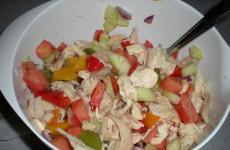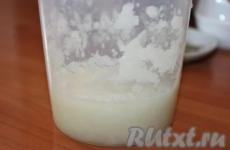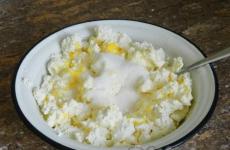Unique extracurricular activities for elementary school. Extracurricular activities
In search of new ideas for extracurricular activities, be sure to visit this thematic section on MAAM. Literature and art, folklore and artistic work, choreography and theatrical performances, sports and health protection - this is an approximate list of topics for which events are presented on these pages.
Circles, sections, electives are designed to reveal the inclinations and interests of students, to encourage their desire for independent productive activities of their choice. The materials collected in this section will help you make this work more diverse, interesting and effective.
To help you - a positive experience in organizing extracurricular activities.
Contained in sections:Showing publications 1-10 of 326 .
All sections | Extracurricular activities. Extracurricular activities at school
The work program of extracurricular activities "Lego-construction" for grade 2 Work program for extracurricular activities"Lego construction" textbook: "Construction" author: Volkova S. I. publishing house / year: M: "Education", 2009 per level education: primary general 2nd grade date compiling: 06/18/2019 compilers (FULL NAME) : Rogovskoy A.A. 1....
Work program for extracurricular activities Grade 3 "Programming" Work program for extracurricular activities"Fascinating Programming" textbook: "Computer science. Mathematics. Programs extracurricular activities for primary and basic schools : 3 - 6 grades " author: Tsvetkova M.S., Bogomolova O.B. publishing house/ year: M. : BINOM. Knowledge Lab,...
Extracurricular activities. Extracurricular activities at school - Work program of extracurricular activities "Information geometry" Grade 2
Publication "Working program of extracurricular activities" Information geometry "..." The work program for extracurricular activities "Information geometry" textbook: "Visual geometry" author: Istomina N.B. publisher / year: Smolensk: Association XXI century, 2013. on the level of education: primary general grade 2 date of compilation: 06/18/2019 compilers (full name): ...
MAAM Pictures Library
The work program of extracurricular activities "Robotics" in grade 1 The work program for extracurricular activities "Robotics" textbook: "Robotics for children and parents" author: Filippov S.A. publisher / year: St. Petersburg: Nauka, 2010 at the level of education: primary general, grade 1 date of compilation: 06/17/2019 compilers (full name): Rogovskoy ...
Summary of extracurricular activities in grades 1-4 "Arctic - the facade of Russia" The Arctic is the facade of Russia The purpose of the lesson: to increase students' awareness of nature, the history of research and development, the tasks of modern development of the Arctic; education of patriotism and pride in the greatness of their country, the courage and resilience of their people. Create bright...
 The work of elementary school students in the Google cloud. Relevance of the work: Search for new ways of effective organization of the educational process. The purpose of the work: 1. Expansion of knowledge and development of interests among students about the small Motherland: its history, traditions, cultural ...
The work of elementary school students in the Google cloud. Relevance of the work: Search for new ways of effective organization of the educational process. The purpose of the work: 1. Expansion of knowledge and development of interests among students about the small Motherland: its history, traditions, cultural ...
Extracurricular activities. Extracurricular activities at school - The work program of the extracurricular activity course "Geography of the Bryansk Territory" for grade 6
Explanatory note The work program of the extracurricular activity course "Geography of the Bryansk Territory" for 6 classes of the MBOU "Mglinskaya secondary school No. 2" for the 2018-2019 academic year was developed in accordance with the Regulations on the work program of the subject, the course in the context of the implementation of the Federal State Educational Standard (approved ...
Work program for extracurricular activities "A healthy mind in a healthy body" MAOU - Lyceum No. 13, Krasnoobsk, Novosibirsk District, Novosibirsk Region EDUCATIONAL PROGRAM FOR ORGANIZING EXTRA COURSE ACTIVITIES FOR STUDENTS "A healthy mind in a healthy body" Teacher of physical culture of the first qualification category Gorskaya N.S. Explanatory note....
Extracurricular activities programs
The main idea of this program is to create a comfortable atmosphere in the children's team that awakens students' interest in self-realization, the manifestation and development of their abilities, individual and collective creativity, mastering the skills and abilities of self-knowledge, self-development, self-education, self-improvement. This program was developed by the employees of GOU DPO NIRO and certified by the NIES GOU DPO NIRO and the regional expert council of the Ministry of Education of the Nizhny Novgorod Region. The program has a spiritual and moral orientation. The program is designed for 4 years, for students in grades 1-4 for 1 hour per week.
The program introduces the process of creating a newspaper. It is aimed at developing students' speech skills necessary for writing creative works, it also provides for the development of cooperation skills with peers and adults in different social situations, the willingness to hear and listen to the interlocutor and engage in dialogue, the willingness to recognize the possibility of the existence of different points of view and the right of everyone to have their own, Express your opinion and argue your point of view and assessment of events. The program has a social focus. The course was developed on the basis of the requirements of the Federal National Standard and is intended for use in extracurricular activities for students in grades 1-4 of elementary school for 1-2 hours per week (34-68 hours per year).
The work program of the general cultural direction "Little Country" was developed in accordance with the Federal State Educational Standard for Primary General Education.
The program of extracurricular activities "Little Country" (Theatrical Studio Program) was developed by S.V. Rigina, a primary school teacher at the Lyceum No. 165 in N. Novgorod. This course was developed to implement the general cultural direction of extracurricular activities for secondary schools, in accordance with the federal requirements for the implementation of the Federal State Educational Standard, IEO, certified by the expert council of the GOU DPO NIRO or the regional expert council of the Ministry of Education of the Nizhny Novgorod Region in 2011.
The program is designed for 4 years of study (from grades 1 to 4) and is based on the following assumption: theatrical activity as a process of developing creative abilities and socializing the personality of a younger student is procedural. The most important thing in the children's creative theater is the process of rehearsals, the process of creative experience and embodiment. The process of theater classes is based on developing techniques and is a system of creative games and sketches aimed at developing the psychomotor and aesthetic abilities of children.
Extracurricular activities of students at the level of primary general education are carried out in accordance with the "Comprehensive Program for the Intellectual Development of Children" (Nizyaeva E.V. teacher of the highest category, Honored Teacher of Russia, a team of lyceum teachers. Program for elementary school students. 2007).
The federal state educational standard of primary general education is focused on achieving the main goal of general secondary education - the formation of a responsible, critically thinking person capable of goal-setting, choice and action in a rapidly changing socio-cultural world.
MODULE - 1 "I KNOW THE WORLD" (research activities of students as a means of developing creativity)
The educational system of elementary school is built in such a way that the emphasis in the content of education is on solving a system of problems, with the help of which it is possible to purposefully form the basics of theoretical thinking, the basics of the ability to learn and ways of educational cooperation in its various manifestations in younger students.
Classes are held once a week - 33 hours a year (grade 1) and 34 hours (grades 2-4).
5
The relevance and pedagogical expediency of this program of extracurricular activities are due to the state of health of schoolchildren.
The main goal of this program is to develop an understanding of health among younger students as the harmony of their inner world, its biological, social and spiritual principles, as well as the harmony of interaction with the external world - the natural and social environment - through obtaining practical skills for such interaction. The most important result of the program can be considered a change in the views and ideas of students about their health and ways to preserve and increase it, that is, the formation of certain value and worldview attitudes towards health and a healthy lifestyle
Age of children: 7-10 years. Program implementation period: 4 years.

Subject: Mathematics
A series of simulators fully complies with the federal educational standard (second generation) for elementary school. The simulator is designed for the formation and development of important mathematical skills of third-graders. Its main goal is to develop the skills of fast and error-free counting within 1000. A system of various tasks will help children learn practical methods of adding and subtracting numbers within 1000, multiplication and division. The simulator in their work can be used by teachers, teachers of additional education. For parents of students, these simulators will help organize independent work for the successful development of the mathematics course program in the 3rd grade. This simulator contains 16 examples on the designated topic.
When working with a presentation, moving to the next slide is a mouse click


Subject: Mathematics
Target audience: for grade 3
The last simulator of a series of simulators for grade 2. The resource is intended for the formation and development of important mathematical skills of second-graders. Its main goal is to form the skills of fast and error-free counting within 100. The simulator contains 16 examples of multiplication and division on the designated topic. The resource is intended for frontal work in the lesson, independent work of students in grades 2, can be used for distance learning .. When showing a presentation, the transition to the next slide is by clicking


Subject: Mathematics
A series of simulators fully complies with the federal educational standard (second generation) for elementary school. The simulator is designed for the formation and development of important mathematical skills of third-graders. Its main goal is to develop the skills of fast and error-free counting within 1000. A system of various tasks will help children learn practical methods of adding and subtracting numbers within 1000, multiplication and division. The simulator in their work can be used by teachers, teachers of additional education. For parents of students, these simulators will help organize independent work for the successful development of the mathematics course program in the 3rd grade. This simulator contains 16 examples on the designated topic.
When working with a presentation, moving to the next slide is a mouse click


Subject: Mathematics
Target audience: for grade 3


Subject: Mathematics
Target audience: for grade 2
A series of simulators fully complies with the federal educational standard (second generation) for elementary school. The simulator is designed for the formation and development of important mathematical skills of third-graders. Its main goal is to develop the skills of fast and error-free counting within 1000. A system of various tasks will help children learn practical methods of adding and subtracting numbers within 1000, multiplication and division. The simulator in their work can be used by teachers, teachers of additional education. For parents of students, these simulators will help organize independent work for the successful development of the mathematics course program in the 3rd grade. This simulator contains 16 examples on the designated topic.
When working with a presentation, moving to the next slide is a mouse click


Subject: Mathematics
Target audience: for grade 3


Subject: Mathematics
Target audience: for grade 2
A series of simulators fully complies with the federal educational standard (second generation) for elementary school. The simulator is designed for the formation and development of important mathematical skills of third-graders. Its main goal is to develop the skills of fast and error-free counting within 1000. A system of various tasks will help children learn practical methods of adding and subtracting numbers within 1000, multiplication and division. The simulator in their work can be used by teachers, teachers of additional education. For parents of students, these simulators will help organize independent work for the successful development of the mathematics course program in the 3rd grade. This simulator contains 16 examples on the designated topic.
When working with a presentation, moving to the next slide is a mouse click


Subject: Mathematics
Target audience: for grade 3
Continuation of a series of simulators for grade 2. The resource is intended for the formation and development of important mathematical skills of second-graders. Its main goal is to develop the skills of fast and error-free counting within 100. The simulator contains 10 multiplication examples on the designated topic. The resource is intended for frontal work in the lesson, independent work of students in grades 2, can be used for distance learning .. When showing a presentation, the transition to the next slide is by clicking


Subject: Mathematics
Target audience: for grade 2
This resource containing illustrative and educational material on the topic "Animals" can be used in the lesson on the subject of the world around. Perhaps fragmentary use of the presentation in the classroom with a class, a group of students, individually.


Subject: World around
Target audience: for teachers
In childhood, all children listened to fairy tales, singled out their favorite ones, imitated the heroes, and there was also an awareness of good and evil. Fairy tales had a great influence on the formation of the personality of each child. In childhood, everything leaves a mark. Each meeting, conversation, book, impression - everything that stimulates the work of consciousness, feelings, and above all, the practical activity of the child, his work - all this forms a personality. Folk tales educate the child in the traditions of the people, inform him of a vision of life based on the spiritual and moral beliefs of the people. I offer primary school teachers and kindergarten teachers the intellectual game “About fairy tales and fairy tales”.
Purpose: Recall with students previously studied fairy tales
Tasks: - To develop imaginative thinking in students;
- Raise the need for reading;
- To cultivate kindness and mutual assistance in the team;
- Activate children's knowledge of Russian folk tales.



Subject: Literary reading
Target audience: for grade 1
A series of simulators fully complies with the federal educational standard (second generation) for elementary school. The simulator is designed for the formation and development of important mathematical skills of third-graders. Its main goal is to develop the skills of fast and error-free counting within 1000. A system of various tasks will help children learn practical methods of adding and subtracting numbers within 1000, multiplication and division. The simulator in their work can be used by teachers, teachers of additional education. For parents of students, these simulators will help organize independent work for the successful development of the mathematics course program in the 3rd grade. This simulator contains 16 examples on the designated topic.
When working with a presentation, moving to the next slide is a mouse click


Subject: Mathematics
Target audience: for grade 3
Continuation of a series of simulators for grade 2. The resource is intended for the formation and development of important mathematical skills of second-graders. Its main goal is to form the skills of fast and error-free counting within 100. The simulator contains 16 examples of multiplication and division on the designated topic. The resource is intended for frontal work in the lesson, independent work of students in grades 2, can be used for distance learning .. When showing a presentation, the transition to the next slide is by clicking


Subject: Mathematics
Target audience: for grade 2
A series of simulators fully complies with the federal educational standard (second generation) for elementary school. The simulator is designed for the formation and development of important mathematical skills of third-graders. Its main goal is to develop the skills of fast and error-free counting within 1000. A system of various tasks will help children learn practical methods of adding and subtracting numbers within 1000, multiplication and division. The simulator in their work can be used by teachers, teachers of additional education. For parents of students, these simulators will help organize independent work for the successful development of the mathematics course program in the 3rd grade. This simulator contains 16 examples on the designated topic.
When working with a presentation, moving to the next slide is a mouse click


Subject: Mathematics
Target audience: for grade 3
Continuation of a series of simulators for grade 2. The resource is intended for the formation and development of important mathematical skills of second-graders. Its main goal is to develop the skills of fast and error-free counting within 100. The simulator contains 10 examples per division on the designated topic. The resource is intended for frontal work in the lesson, independent work of students in grades 2, can be used for distance learning .. When showing a presentation, the transition to the next slide is by clicking


Subject: Mathematics
Target audience: for grade 2
A series of simulators fully complies with the federal educational standard (second generation) for elementary school. The simulator is designed for the formation and development of important mathematical skills of third-graders. Its main goal is to develop the skills of fast and error-free counting within 1000. A system of various tasks will help children learn practical methods of adding and subtracting numbers within 1000, multiplication and division. The simulator in their work can be used by teachers, teachers of additional education. For parents of students, these simulators will help organize independent work for the successful development of the mathematics course program in the 3rd grade. This simulator contains 10 examples on the designated topic.
When working with a presentation, moving to the next slide is a mouse click






